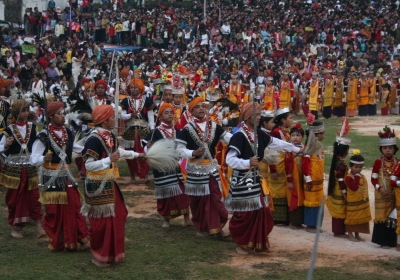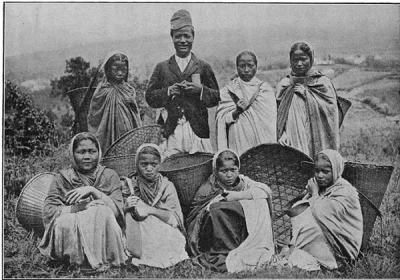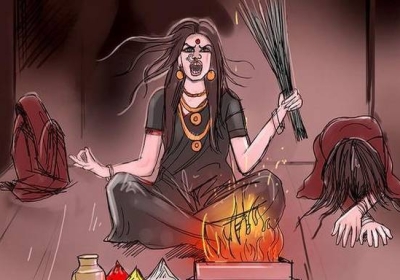KHASI MATRILINEAL CLAN LINEAGE P: THE SOCIO- ECONOMIC AND POLITICAL MOVEMENT

The British administrative officials misinterpreted Khasi customary practices, which have demoralised the integrity of Khasi male members in such a manner that the authority in the core family council was usurped wrongly by the female members, especially by the youngest daughter in the family. Contrary to the ancient custom, the wrong law still prevails today and compelled the community to resort to resistance. The one-man mission of Maitshaphrang Movement is a decade-long operation spearheaded by Mr Micheal N Syiem. The British colonial invasion has devastated the interpretation of customary laws to the extent that the matrilineal is almost transformed into the matriarchal system. The consistent demand for equitable distribution of ancestral properties and the compulsory registration of marriage as a legal mechanism to safeguard and stabilise the Khasi society is being pursued to enact as a law and it was only in 2018 that the State government have responded to the communication from the movement. Perhaps, Michael Syiem and his close associates in the movement have realised about the rampant indulgence of Khasi women in casual marriage with opportunists from other communities, the widespread incidence of single mother and the outrageous disparity in the inheritance of ancestral properties that they have vehemently struggled for their cause. However, the aim is primarily on material benefit rather than of sustenance of ethnic identity and maintenance of cultural legacy.
Another legitimate confrontation is the bill for amendment of the Khasi Custom of Lineage Act of the Khasi Hills Autonomous District Council initiated by the Chief Executive Member, Mr Hispreachering Son Shylla. The amendment sought to deprive the Khasi women of all customary and legal privileges if they marry the men of communities other than Khasi. Perhaps, the intention is in favour of protection of the ethnic community, but the interpretation is in conflict with the law of natural justice and against the cohort of certain vested interest women in the society. Few extrovert and liberal women leaders are up in arms against Mr Hispreachering Son Shylla, Chief Executive Member, Khasi Hills Autonomous District Council asserting for women's rights. If the KHADC is ignoring certain credible institutions like the village and locality councils (dorbar shnong), few civil society groups, social scientists and academicians, kinship organisations (Seng Kur) and some cultural exponent of Khasi traditions, it will pave the way for the pressure groups like Thma U Rangli and Civil Society Women's Organisation to distort the genuine issue and convert it into women's rights concern. Possibly, the middle path is for Mr Hispreachering Son Shylla to consider a thorough debate and discussion with the credible institutions and civil society groups; and for the pressure groups to restrain their prejudiced opinion on the contaminated customary practices based on colonial version. Nevertheless, the bill was recalled by the KHADC and in all probability majority of the people are anxious that good sense should prevail before enacting a law, even as the situation is already not as proper as it should be.
Meanwhile, the Clan Bill is already spearheaded with certain provision to safeguard the interest of every Khasi clan in every social situation that is vulnerable to infringement with legal interpretation by opportunists. Simultaneously, the Synjuk Ki Rangbah Kur {SKRK} was formed under the initiative of Mr Hisprechering Son Shylla, in whose dispensation he subsequently took the leadership after his tenure in the Khasi Hills District Council completed its term. The SKRK, a conglomeration of the clan elders of all the Khasi clans working in consultation with the each and every active clan organisation or the Seng Kur, although motivation is being facilitated that every clan should formulate the clan organisation and affiliate with the SKRK. However, Mr Hispreachering Son Shylla handed over the leadership to former judicial officer, Herman Nongrum with the motive to take a sojourn for other social reformation efforts. The SKRK is rigorously motivated for setting up of various units of the clan elders in its mission to restore the ancient system and transform the indigenous society to be adapted according to the contemporary situation.
The bare reality in the society is a well known fact to one and all that statistic is not required to assess the magnitude of most Khasi middle class women and poorer strata of the society that are engaging in casual marriage with opportunists from other communities for selfish economic gain and social security. Furthermore, if the motive is not in favour of the men from other communities to take control of the situation, separation is inevitable and majority of the Khasi women became single parent and resort to rebellious stance. This is another fact that is blatantly visible in society and the primary reason is that the family structure is weak because the male members are deprived of the authority to protect their respective families. The Khasi women always take the upper hand on any vital decision- making process, because most of the men neither have the sufficient authority over his wife and children nor earn decent respect at his maternal family. The so called double edge sword of Khasi men in the capacity of simultaneously a father and a maternal uncle is already blunt, as most of the Khasi women played a dual role of challenging both their husbands and their brothers or even their maternal uncles on certain strategies to suit their interest. On the one hand the Khasi woman will not tolerate her husband to interfere in the affairs of the clan according to custom, and on the other hand she will not accept her brother or maternal uncle to intervene in the family supposedly headed by the father according to Christian tradition. Most of the Khasi women will utilise both traditions to go well with their agenda. Nevertheless, there are families where the maternal uncle is having the ability of a responsible guardian over his nephews and nieces, as well as the rights of a father over his children. It is human nature to want more than they actually need. Some Khasi men would indulge in immoral deeds of keeping all their earnings, while they alternately blame to have spent on both the mother (the maternal family) and the wife. Likewise, some Khasi women would accumulate enormous family wealth and seize all ancestral properties overriding their parents and other siblings.
In this manner, extensive resources that have been reserved for generations in the community are being swindled by many legitimate youngest daughters of different families, either on personal accord or in nexus with their unscrupulous husbands, and on certain cases in laws are also involved with fraudulent means. Furthermore, there are many instances that the Khasi wives are vulnerable to deception by their husbands from other communities in terms of material wealth and personal relationship. The fact that the other communities are exposed to complex socio-economic situations prevalent elsewhere in the commercially advanced regions are liable to tactfully persuade the simple Khasi women in any transaction, including marital bondage. When the family atmosphere is stable the husbands from other communities gained foothold, they would tend to take the upper hand and control over the entire domestic affairs. More often, these people hailing from the dominant community would also try to assert and impose their culture on the children and on many occasions they could estrange their Khasi wives, of whom they might be compelled to tolerate their husbands to remarry among their own community as desired by the in laws. This is the kind of attitude and hegemony of the majority of the mainland people towards the tribal people of the region. It is part of the natural process of social development that the dominant cultures from the surrounding mainstream areas will tend to overwhelm over the cultures of the neighbouring periphery.







